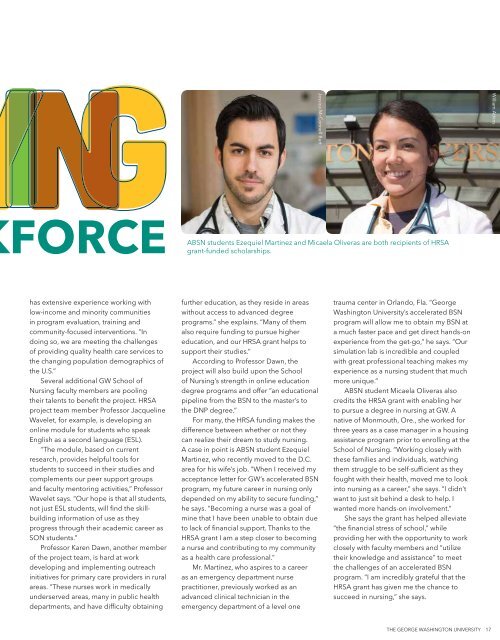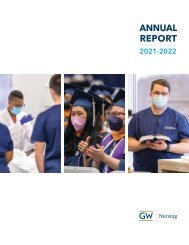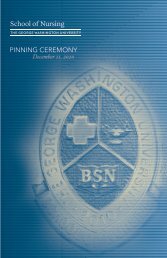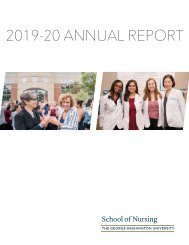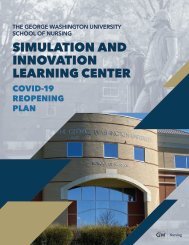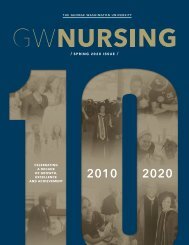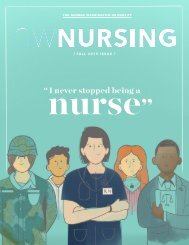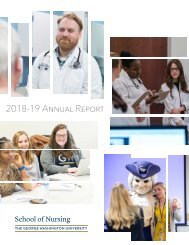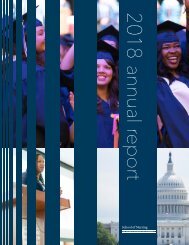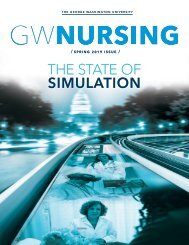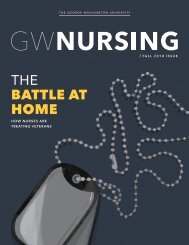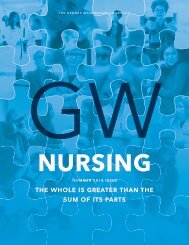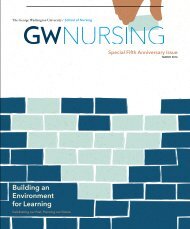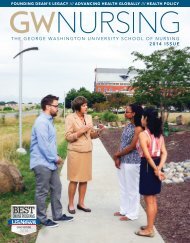GW Nursing Magazine Spring 2013
GW Nursing is a publication of the George Washington University School of Nursing. The magazine tells the story of GW nurses and their endeavors in the areas of education, research, policy and practice.
GW Nursing is a publication of the George Washington University School of Nursing. The magazine tells the story of GW nurses and their endeavors in the areas of education, research, policy and practice.
Create successful ePaper yourself
Turn your PDF publications into a flip-book with our unique Google optimized e-Paper software.
William Atkins<br />
Jessica McConnell Burt<br />
FORCE<br />
ABSN students Ezequiel Martinez and Micaela Oliveras are both recipients of HRSA<br />
grant-funded scholarships.<br />
has extensive experience working with<br />
low-income and minority communities<br />
in program evaluation, training and<br />
community-focused interventions. “In<br />
doing so, we are meeting the challenges<br />
of providing quality health care services to<br />
the changing population demographics of<br />
the U.S.”<br />
Several additional <strong>GW</strong> School of<br />
<strong>Nursing</strong> faculty members are pooling<br />
their talents to benefit the project. HRSA<br />
project team member Professor Jacqueline<br />
Wavelet, for example, is developing an<br />
online module for students who speak<br />
English as a second language (ESL).<br />
“The module, based on current<br />
research, provides helpful tools for<br />
students to succeed in their studies and<br />
complements our peer support groups<br />
and faculty mentoring activities,” Professor<br />
Wavelet says. “Our hope is that all students,<br />
not just ESL students, will find the skillbuilding<br />
information of use as they<br />
progress through their academic career as<br />
SON students.”<br />
Professor Karen Dawn, another member<br />
of the project team, is hard at work<br />
developing and implementing outreach<br />
initiatives for primary care providers in rural<br />
areas. “These nurses work in medically<br />
underserved areas, many in public health<br />
departments, and have difficulty obtaining<br />
further education, as they reside in areas<br />
without access to advanced degree<br />
programs.” she explains. “Many of them<br />
also require funding to pursue higher<br />
education, and our HRSA grant helps to<br />
support their studies.”<br />
According to Professor Dawn, the<br />
project will also build upon the School<br />
of <strong>Nursing</strong>’s strength in online education<br />
degree programs and offer “an educational<br />
pipeline from the BSN to the master’s to<br />
the DNP degree.”<br />
For many, the HRSA funding makes the<br />
difference between whether or not they<br />
can realize their dream to study nursing.<br />
A case in point is ABSN student Ezequiel<br />
Martinez, who recently moved to the D.C.<br />
area for his wife’s job. “When I received my<br />
acceptance letter for <strong>GW</strong>’s accelerated BSN<br />
program, my future career in nursing only<br />
depended on my ability to secure funding,”<br />
he says. “Becoming a nurse was a goal of<br />
mine that I have been unable to obtain due<br />
to lack of financial support. Thanks to the<br />
HRSA grant I am a step closer to becoming<br />
a nurse and contributing to my community<br />
as a health care professional.”<br />
Mr. Martinez, who aspires to a career<br />
as an emergency department nurse<br />
practitioner, previously worked as an<br />
advanced clinical technician in the<br />
emergency department of a level one<br />
trauma center in Orlando, Fla. “George<br />
Washington University’s accelerated BSN<br />
program will allow me to obtain my BSN at<br />
a much faster pace and get direct hands-on<br />
experience from the get-go,” he says. “Our<br />
simulation lab is incredible and coupled<br />
with great professional teaching makes my<br />
experience as a nursing student that much<br />
more unique.”<br />
ABSN student Micaela Oliveras also<br />
credits the HRSA grant with enabling her<br />
to pursue a degree in nursing at <strong>GW</strong>. A<br />
native of Monmouth, Ore., she worked for<br />
three years as a case manager in a housing<br />
assistance program prior to enrolling at the<br />
School of <strong>Nursing</strong>. “Working closely with<br />
these families and individuals, watching<br />
them struggle to be self-sufficient as they<br />
fought with their health, moved me to look<br />
into nursing as a career,” she says. “I didn’t<br />
want to just sit behind a desk to help. I<br />
wanted more hands-on involvement.”<br />
She says the grant has helped alleviate<br />
“the financial stress of school,” while<br />
providing her with the opportunity to work<br />
closely with faculty members and “utilize<br />
their knowledge and assistance” to meet<br />
the challenges of an accelerated BSN<br />
program. “I am incredibly grateful that the<br />
HRSA grant has given me the chance to<br />
succeed in nursing,” she says.<br />
THE GEORGE WASHINGTON UNIVERSITY 17


